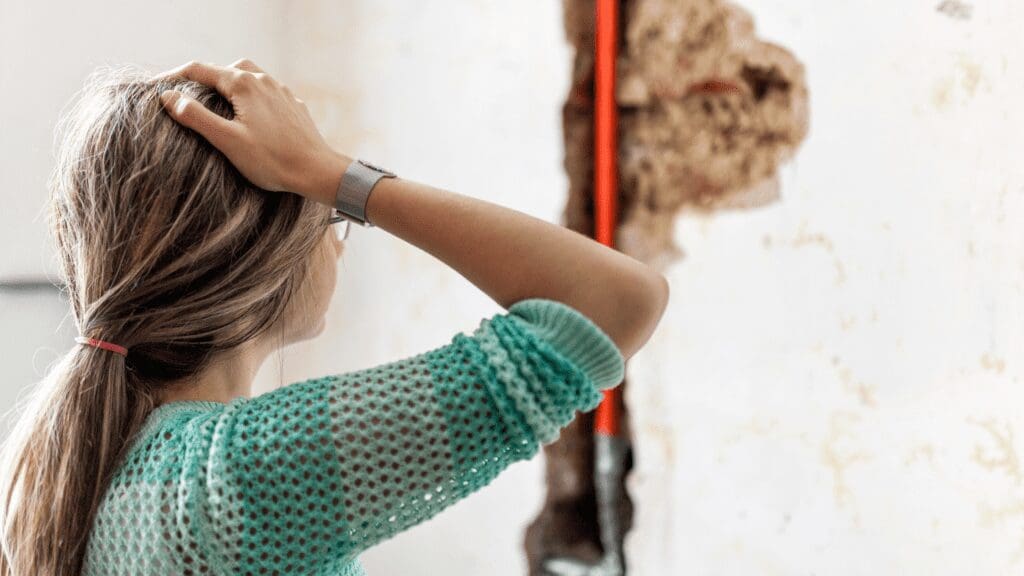Plumbing leaks and foundation damage may seem like two separate issues. But in reality, a causal relationship exists between them. In this case, a causal relationship essentially means that plumbing leaks can cause foundation damage and vice versa. To better understand how different plumbing problems can affect your home’s foundation, let’s discuss two scenarios that could impact any home in Houston.
How Plumbing Leaks Affect Foundations Built on Clay Soil
Although Houston homes can differ in many respects, they have two things in common: the soil underneath their foundations and the location of their plumbing systems. In general, the homes built in the Greater Houston area have foundations that sit onexpansive clay soil. Because this type of soil is susceptible to moisture fluctuations, it isn’t particularly good for construction.
Coming down to the plumbing system, one important thing you should know is that a part of this system is typically located underneath the foundation, where it connects to the home’s water supply and sewer lines.
Like any other components of your home, your plumbing system may become damaged due to normal wear and tear or other factors. As a result, one or more fittings may start to leak and pipes may crack or burst. While any leak can lead to various issues over time, the most dangerous leaks are those hidden inside walls or floor systems. Besides being difficult to fix, a hidden leak can go undetected for weeks or months. When that happens, even a small leak could cause major property damage down the road. Here is why.
When aleaky pipe, fitting, or joint is located inside a wall or under the floor, the water will continue to accumulate in different parts of your home, creating favorable conditions for mold growth and causing wood and drywall to swell. As the water continues to leak out of the pipe and move downwards, it will eventually reach your subfloor, including the slab and foundation, which are made of concrete. Concrete is a porous material and, therefore, the water will easily seep into and move through the tiny pores and capillaries of your slab and foundation. Once the water reaches the area under your foundation, it will be absorbed by the clay soil that supports your home.
Continuous exposure to water will cause the soil to expand considerably, which may lead to upheaval. An upheaval can create a lot of pressure under your foundation. Combined with thehydrostatic pressure resulting from the water that continues to accumulate underneath your home, the upheaval could cause your entire foundation or just a part of it to move upwards. Consequently, the slab and foundation may bend and crack.
Due to prolonged exposure to water, the soil can also become overly wet and soft, with a muddy consistency. In that case, the soil might still be able to support the weight of your home. However, it may no longer provide a solid base for your foundation. Depending on the loads above and the variations in the soil texture, structure, porosity, density, stability, and moisture content, one side of your foundation may start to sink into the ground, causing the other sides to move upwards. All this movement could force your foundation out of level. This phenomenon is known asdifferential settlement and can lead to a wide range of cosmetic and structural issues within your home.
How Foundation Problems Can Affect Your Plumbing System
Regardless of the underlying causes, when a foundation moves, shifts, sinks, and/or cracks, it can exert a lot of pressure on the pipes and fittings that run underneath and through it. Because this movement is usually very slow, it might take some time before the pipes will develop cracks, become misaligned, or pull apart and start to leak.
In addition to softening the ground, the water that gets underneath and around your home could wash away some of the soil under your foundation, leaving small cavities behind. This may cause more noticeable shifting, sinking, and cracking as well as other potential structural problems throughout your home.
A point worth mentioning is that most leaks that occur under a foundation aren’t always readily apparent in the beginning. Thus, to identify foundation problems and prevent any plumbing issues that may be caused by foundation movement, you should have your foundation and plumbing system checked by a professional on a regular basis.
Whether you suspect a leak in your plumbing system, or you’ve noticed a problem with your home’s foundation, hiring a licensed and insured contractor with plenty of experience repairing foundations and plumbing systems is the best thing you can do to prevent further damage to your property. If you’re looking for a reputable and experienced contractor that can fully address all of your foundation and plumbing problems,reach out to us today to schedule a free inspection and get a free estimate!

